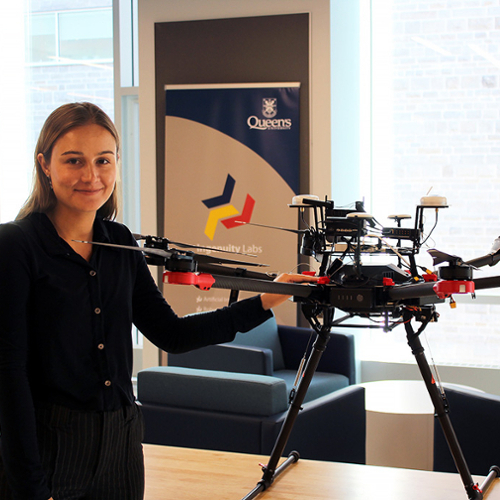Someone has gone missing, and time is of the essence for a successful recovery. You know roughly where the person was last seen, but the terrain is difficult to navigate.
In addition to ground searches and support from helicopters or planes, the job of searching and videotaping an area can be handled more efficiently by a drone. However, even once you’ve set the flight path and started taping, there’s still potentially hours of manual work ahead as you review footage for clues.
That’s why researchers like Melissa Greeff are working on planning and control algorithms and vision-based navigation for aerial robots. These technologies are intended to help flying robots like drones navigate autonomously, saving drone pilots time and potentially allowing for more frequent flights.
“I've always been fascinated by things that fly and during my Masters and PhD I got the opportunity to work on flying robots,” she says. “I enjoyed being able to build the intelligence into these systems and push the limits of what we're able to do.”
Naturally, the technology has applications well beyond search and rescue. A drone programmed to know what it’s looking for could be used to survey land for potential development or to locate mining resources, or could conduct inspection tasks on tall towers or in hard-to-reach areas. The technology could have implications for flying cars in the future as well.
“Having more data means we can reach more informed engineering decisions more quickly,” she says.
Greeff’s research will be done both inside and outdoors, though it will be some time before you see her drones hovering overhead on campus. In the meantime, she is looking forward to running some drone flight demonstrations within Ingenuity Labs.
Greeff joined the Department of Electrical and Computer Engineering in Fall 2022 and is teaching her first course this term on signals and systems for second-year mechatronics students. She has also recently started supervising a graduate student and is establishing her lab within Ingenuity Labs.
“There's a lot of very exciting work being done at Queen’s in robotics, specifically in intelligent systems, and when I heard about Ingenuity Labs and was sold the vision, I wanted to be a part of it,” she says.
Prior to joining Queen’s, Greeff completed bachelor and doctoral studies at the University of Toronto focused on mechatronics, robotics, and automation engineering. She also worked as an engineering intern at both Bombardier and De Beers Canada.
Greeff has loaned her time and talents to organizations like Habitat for Humanity, Women in Science and Engineering (WISE), ILead Engineering Leadership Organization, Outreach Maths and English Program in South Africa, and, most recently, a women in robotics organization chapter in Ontario which held its first events in the fall of 2022.
“The group is for women from high school through to working professionals,” she says. “We’re planning events and aim to provide mentorship and other opportunities to build skills and expertise.”
